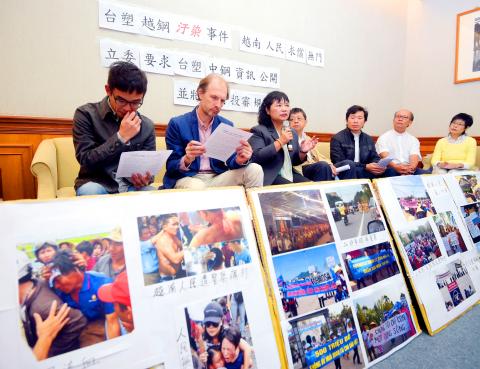A Vietnamese Catholic priest yesterday held a news conference in Taipei to complain about the operations of Formosa Ha Tinh Steel Corp, a Vietnamese subsidiary of Formosa Plastics Group (FPG).
Father Nguyen Dihn Thuc from the Catholic Diocese of Vinh, who was accompanied at the news conference by Taiwanese lawmakers and representatives of several non-governmental organizations, said pollution from the plant in Ha Tinh Province has severely affected the region’s residents physically and spiritually.
Vietnamese fishermen have been particularly affected as massive numbers of fish were poisoned by chemicals discharged by the steel plant in April, and without fish to sell, they are unable to buy food for their families or provide schooling for their children, Nguyen said.

Photo: Huang Yao-cheng, Taipei Times
He said he hopes the Legislative Yuan could help the Vietnamese in three ways: by demanding that the company publicize information about the level of pollution emitted by the steel plant; by providing specific details about cleanup efforts and compensation; and by ensuring that the plant is outfitted with proper equipment to process pollutants.
FPG on July 7 promised to pay US$500 million compensation to residents affected by the discharge of toxic waste and massive fish deaths in April.
The money has yet to be paid to the region’s residents, Nguyen said.
FPG should also be responsible for paying for health check-ups for those residents affected by the spill in April, he said.
If the steel plant cannot guarantee transparency of information, then it should be shut down and asked to leave Vietnam, Nguyen said.
The pollution caused by the plant has damaged Taiwan’s national reputation and would affect President Tsai Ing-wen’s (蔡英文) “new southbound policy,” he said.
The government and private corporations should take responsibility, Democratic Progressive Party (DPP) Legislator Su Chih-fen (蘇治芬) said, adding that she would ask the company to provide specific plans on how it plans to compensate for the damage.
Su said that she would pressure Formosa Plastics through state-run China Steel Corp, which holds a 25 percent stake in the company, adding that Taiwan should help other nations through democratic means while maintaining responsibility toward environmental conservation.
DPP Legislator Wu Kun-yuh (吳焜裕) said that during his most recent visit to Vietnam, he saw an increasing emphasis by the Vietnamese government on environmental protection.
Taiwan’s government should ensure that such concerns are included when it drafts its plans for the “new southbound policy,” he said.
Wu said that Taiwanese businesspeople abroad should ensure that environmental protection is a key part of their investments and make a good impression for Taiwanese businesspeople in general.
DPP Legislator Chen Man-li (陳曼麗) said the Legislative Yuan should consider ways that it could legally ensure Taiwanese investors adhere to corporate morals, adding that she would talk with the Executive Yuan about the issue.
While Nguyen said the affected residents have yet to receive compensation from FPG, Vietnamese Minister of Natural Resources and the Environment Tran Hong Ha said in a televised meeting held by the Vietnamese parliament on July 30 that FPG had paid US$250 million in compensation on July 28 and that the remainder was expected to be paid on Aug. 28.
Additional reporting by Diane Baker

DEFENSE: The National Security Bureau promised to expand communication and intelligence cooperation with global partners and enhance its strategic analytical skills China has not only increased military exercises and “gray zone” tactics against Taiwan this year, but also continues to recruit military personnel for espionage, the National Security Bureau (NSB) said yesterday in a report to the Legislative Yuan. The bureau submitted the report ahead of NSB Director-General Tsai Ming-yen’s (蔡明彥) appearance before the Foreign and National Defense Committee today. Last year, the Chinese People’s Liberation Army (PLA) conducted “Joint Sword-2024A and B” military exercises targeting Taiwan and carried out 40 combat readiness patrols, the bureau said. In addition, Chinese military aircraft entered Taiwan’s airspace 3,070 times last year, up about

A magnitude 4.3 earthquake struck eastern Taiwan's Hualien County at 8:31am today, according to the Central Weather Administration (CWA). The epicenter of the temblor was located in Hualien County, about 70.3 kilometers south southwest of Hualien County Hall, at a depth of 23.2km, according to the administration. There were no immediate reports of damage resulting from the quake. The earthquake's intensity, which gauges the actual effect of a temblor, was highest in Taitung County, where it measured 3 on Taiwan's 7-tier intensity scale. The quake also measured an intensity of 2 in Hualien and Nantou counties, the CWA said.

The Overseas Community Affairs Council (OCAC) yesterday announced a fundraising campaign to support survivors of the magnitude 7.7 earthquake that struck Myanmar on March 28, with two prayer events scheduled in Taipei and Taichung later this week. “While initial rescue operations have concluded [in Myanmar], many survivors are now facing increasingly difficult living conditions,” OCAC Minister Hsu Chia-ching (徐佳青) told a news conference in Taipei. The fundraising campaign, which runs through May 31, is focused on supporting the reconstruction of damaged overseas compatriot schools, assisting students from Myanmar in Taiwan, and providing essential items, such as drinking water, food and medical supplies,

New Party Deputy Secretary-General You Chih-pin (游智彬) this morning went to the National Immigration Agency (NIA) to “turn himself in” after being notified that he had failed to provide proof of having renounced his Chinese household registration. He was one of more than 10,000 naturalized Taiwanese citizens from China who were informed by the NIA that their Taiwanese citizenship might be revoked if they fail to provide the proof in three months, people familiar with the matter said. You said he has proof that he had renounced his Chinese household registration and demanded the NIA provide proof that he still had Chinese